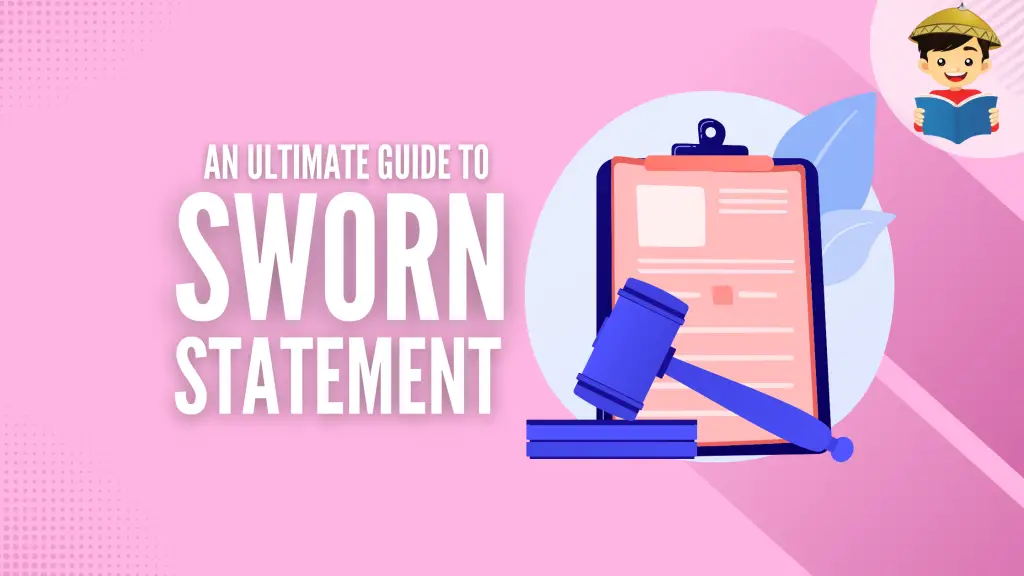How To Get a Sworn Statement (With Free Sample Templates)

You are probably on Google searching how to draft a Sworn Statement or Sinumpaang Salaysay after you were told you need to submit one as it is required in your transaction before a government agency. Perhaps you want to file a case or are currently in a court proceeding and wondering whether you need a Sworn Statement or not.
Whatever the reason, you’ve come to the right place as, in this article, you will learn what a Sworn Statement is and how to draft one or download it from the free templates below. In addition, we will also answer some of your most frequently asked questions on this topic.
DISCLAIMER: This article has been written for general informational purposes only and is not legal advice or a substitute for legal counsel. You should contact your attorney to obtain advice with respect to any particular issue or problem. The use of the information contained herein does not create an attorney-client relationship between the author and the user/reader.
Table of Contents
- What Is a Sworn Statement?
- What Is the Difference Between a Sworn Statement and an Affidavit?
- What Is the Sworn Statement Used For?
- How To Make a Sworn Statement: Step-by-Step Guide
- Sworn Statement Sample Templates (Free Download)
- Tips and Warnings
- Frequently Asked Questions
- 1. Does the Sworn Statement need to be notarized?
- 2. Who are the officers authorized to administer oaths?
- 3. How much does it cost to get a Sworn Statement?
- 4. Can I go to the Public Attorney’s Office (PAO) to get a Sworn Statement?
- 5. What is an Omnibus Sworn Statement?
- 6. Can an unsigned Sworn Statement be valid?
- 7. How many copies of a Sworn Statement do I need for notarization?
- 8. Will I go to jail if I make an untruthful statement in a Sworn Statement?
- References
What Is a Sworn Statement?
A Sworn Statement is a narration or declaration of facts that is sworn to or given under oath by a person before an officer authorized by law to administer affirmation or oaths. Affirmation or oath refers to an act in which an individual avows under penalty of law to the whole truth of the contents of the instrument or document1. As the name implies, it is a statement that is sworn to or made under oath.
When you make a Sworn Statement, you declare and acknowledge that the statement is true and that you may be criminally liable if you lie. In the Philippines, making an untruthful statement under oath may be considered perjury.
What Is the Difference Between a Sworn Statement and an Affidavit?
A Sworn Statement and affidavit are essentially the same in that they both contain narration of facts and are required to be sworn to before an officer authorized to administer an oath. They are most often used interchangeably.
Sworn Statement may be oral (e.g., when you testify as a witness in court or legislative proceedings) or in writing. An affidavit is a form of a Sworn Statement in writing and subscribed and sworn to usually before a notary public. A notary public is one of the officers authorized under the law to administer oaths.
What Is the Sworn Statement Used For?
A Sworn Statement is used when a person is required to make a truthful statement of facts. It is usually needed in judicial and quasi-judicial processes and as well as different government transactions, among others.
For example, a Sworn Statement is required when testifying in court. An Omnibus Sworn Statement is needed when joining the government biddings. SALN, or the Sworn Statement of Assets, Liabilities, and Net Worth (SALN), is mandatory for all government employees. When filing a complaint, you need your statement to be under oath as well.
How To Make a Sworn Statement: Step-by-Step Guide
The Sworn Statement comes in different forms depending on what is required by the government entity. However, most require that it be notarized. For purposes of this guide, a notarized Sworn Statement is given as an example. You can then tweak the statement depending on your needs.
1. Prepare the Document

Similar to an affidavit, a notarized Sworn Statement requires the following information:
- Title of the document
- Name of the person making or signing the document, age (he or she must be of legal age), civil status, citizenship, and address
- The person’s narration, declaration, or statement, will depend on what is required by the entity requiring the statement
- The date and place where the document is signed
- Printed name and signature of the person making the statement
- Jurat or the oath or affirmation before a notary public that you have personally signed and subscribed to the Sworn Statement in the notary’s presence.
2. Print at Least Three Copies (or As Many as Required)

Please note that the notary public will retain one copy, so you may prepare as many copies as required.
3. Sign and Take an Oath Before a Notary Public

If the Sworn Statement is required to be notarized, you need to go to a notary public to have the document notarized.
Sworn Statement Sample Templates (Free Download)
Listed below are some samples of Sworn Statements for different purposes commonly used in the Philippines.
- Sworn Statement for Acquiring Parental Advice in Marriage
- Sworn Statement in Support of the Application for Overseas Employment Certificate (OEC)
- Sworn Statement of Capital Investment in Support of the Application for a Business Permit
- Sworn Statement/Declaration of No Improvement of Real Property
- Sworn Statement in Support of the Application for PTU of Loose-Leaf Books of Accounts
You may also access these sworn statements provided by the government:
- Omnibus Sworn Statement for Joining Government Biddings (PhilGEPS Form Revised)
- Sworn Statement of Sources, Amount, and Application of Funds for All Foundations As Required by the Securities and Exchange Commission (SEC)
- Sworn Statement of Assets, Liabilities, and Net Worth (SALN)
- Income Payee’s Sworn Declaration of Gross Receipts/Sales (Annex B-1 and Annex B-2)
Tips and Warnings
- Check the website of the government agency requiring you to submit a Sworn Statement because they usually provide a template for you to download. This will save you the hassle of drafting a Sworn Statement from scratch and ensure that what is mandatory to be stated in a Sworn Statement is present in the document.
- Seek the assistance of a lawyer when drafting a Sworn Statement if you are going to use it in a judicial or quasi-judicial proceeding (e.g., if it will be used to file a case or complaint against another person). This will ensure all the elements of the offense are included in your statement, and that you don’t miss out on important information. Missing important information (e.g., an element of the offense) might result in the dismissal of your case.
- There are no hard and fast rules or strict format when drafting a Sworn Statement. It is enough that all the required details are present in the document. When in doubt, you can just go to a notary public to have the statement drafted for you.
Frequently Asked Questions
1. Does the Sworn Statement need to be notarized?
Generally, Sworn Statements are notarized. However, some Sworn Statements need not be notarized, but it is required that they must be sworn to before a public officer authorized to administer an oath. A notary public is just one of the officers authorized under the law to administer oaths. You should always check the requirements of the agency where you will submit the Sworn Statement.
2. Who are the officers authorized to administer oaths?
A notary public is the most common officer authorized under the law to administer oaths. The law2 also allows the following to administer oaths:
- Members of the judiciary
- Clerks of courts
- Secretary of House of Representatives, Senate, and departments
- Bureau directors
- Register of deeds
- Provincial governors and vice governors
- Mayors
- Other officers in the government whose appointment is vested with the President
- Any officer whose duties, as defined by law or regulation, require presentation to him of any statement under oath
3. How much does it cost to get a Sworn Statement?
Except for sworn statements subscribed and sworn to before a notary public, a Sworn Statement is free as government entities do not charge for taking an oath. Notarization costs vary depending on the location.
4. Can I go to the Public Attorney’s Office (PAO) to get a Sworn Statement?
Yes, PAO lawyers have general authority to administer oaths in connection with the performance of their official duty.
5. What is an Omnibus Sworn Statement?
Omnibus Sworn Statement is a type of Sworn Statement that contains several assertions or declarations. Instead of making one document for each statement, an Omnibus Sworn Statement containing many items or declarations is instead made.
6. Can an unsigned Sworn Statement be valid?
No. An unsigned Sworn Statement is not valid and binding. A Sworn Statement must be subscribed or signed and sworn to before a person authorized to administer oaths.
7. How many copies of a Sworn Statement do I need for notarization?
Usually 3-4 copies. The notary public will retain one copy for their file.
8. Will I go to jail if I make an untruthful statement in a Sworn Statement?
For a person to be liable for the untruthful statement in a Sworn Statement or affidavit, all the elements of perjury penalized under the Revised Penal Code of the Philippines3 must be present. The elements4are as follows:
- There must be a Sworn Statement that is required by law or for a legal purpose
- It must be made under oath before a competent officer
- The statement contains a deliberate assertion of falsehood
- The false declaration is with regard to a material matter.
The first two are clear. As to the third element, a mere lie or falsehood is not enough. The court ruled that assertion of falsehood must be willful, deliberate, and with evil intent and malice on the part of the person making the statement. Deliberate means knowing the statement to be false instead of mere inadvertence5.
As to the fourth element, it is required that the untruthful statement pertains to a material matter. Material matter means “the main fact which was the subject of the inquiry, or any circumstances which tend to prove the fact, or any fact or circumstances which tend to corroborate or strengthen the testimony relative to the subject of the inquiry, or which legitimately affects the credits of any witness who testifies6.” Thus, if you lie about your marital status or address, you may be absolved of perjury if your marital status or your address is not material or not the subject of the case filed against you.
References
- Supreme Court of the Philippines. The 2004 Rules on Notarial Practice (2004).
- Official Gazette. (1987). Executive Order No. 292 [BOOK I/Chapter 10-Official Oaths]. Retrieved from https://www.officialgazette.gov.ph/1987/07/25/executive-order-no-292-book-ichapter-10-official-oaths/
- Philippine Law and Jurisprudence Databank. An Act Revising the Penal Code and Other Penal Laws (1930).
- Eriberto S. Masangkay, Petitioner, vs. People of the Philippines, Respondents., G.R. No. 164443 (Supreme Court of the Philippines 2010).
- Edwin L. Saulo, Petitioner, vs. People of the Philippines and Marsene Alberto, Respondents., G.R. No. 242900 (Supreme Court of the Philippines 2020).
- The United States, Plaintiff-Appellee, v. Lope Estraña, Defendant-Appellant. Vicente Franco, for Appellant., G.R. No. 5751 (Supreme Court of the Philippines 1910).
Written by Atty. Kareen Lucero
Atty. Kareen Lucero
Kareen Lucero is a lawyer previously doing litigation before working for different agencies in the government and for a multinational corporation. She has traveled to 52+ countries including a 3-month solo backpacking in South East Asia and more than 1 year of solo traveling across four continents in the world. As part of giving back, she is passionate about sharing her knowledge of law and travel. She is currently doing consulting work for a government agency. For inquiries, you may reach her via Facebook Messenger (https://m.me/kareen.lucero.77) or email ([email protected]).
Copyright Notice
All materials contained on this site are protected by the Republic of the Philippines copyright law and may not be reproduced, distributed, transmitted, displayed, published, or broadcast without the prior written permission of filipiknow.net or in the case of third party materials, the owner of that content. You may not alter or remove any trademark, copyright, or other notice from copies of the content. Be warned that we have already reported and helped terminate several websites and YouTube channels for blatantly stealing our content. If you wish to use filipiknow.net content for commercial purposes, such as for content syndication, etc., please contact us at legal(at)filipiknow(dot)net